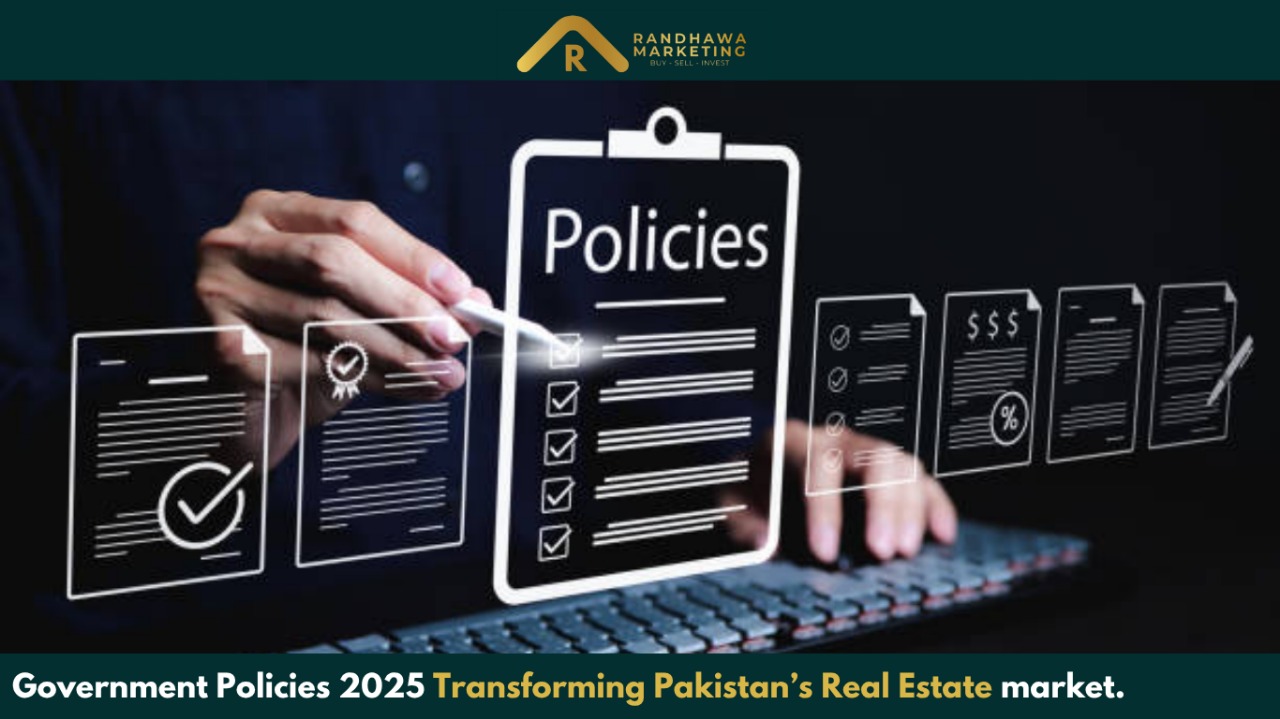
How PropTech is
Revolutionizing Real Estate in Pakistan
For decades, Pakistan’s real
estate sector has been criticized for being slow, opaque, and difficult to
navigate. Property transactions often involved piles of paperwork, lengthy
verification processes, and a lack of transparency that left both buyers and
sellers vulnerable to fraud or misinformation. Investors, too, faced challenges
due to fragmented systems and limited access to reliable market data. Today,
however, the industry is experiencing a remarkable shift. Technology specifically
PropTech (Property + Technology) is streamlining the way real estate is
bought, sold, and managed across the country. From digital property listings
and AI-driven valuations to block chain-backed contracts and smart urban
planning, PropTech is replacing outdated methods with efficient, transparent,
and user-friendly solutions.
This digital transformation is not just making life easier for individual buyers and sellers it’s also empowering developers with better tools, offering investors safer and more accessible opportunities, and giving the entire sector a much-needed credibility boost. In short, PropTech is reshaping Pakistan’s real estate into a modern, technology-driven marketplace that’s more transparent, efficient, and inclusive than ever before.
Digital Property
Portals and Virtual Experiences
In earlier times, searching for
property in Pakistan often meant relying on brokers, newspaper ads, or
word-of-mouth recommendations. This process was slow, limited in scope, and
often left buyers and renters frustrated due to a lack of reliable information.
With the rise of online property portals,
this experience has been completely reshaped.
Today, people can explore
hundreds of property listings through digital platforms, filtering searches by price, location, size, and features.
This makes it far easier to find options that suit specific needs without
wasting time on irrelevant choices. The ability to compare multiple properties
side by side from the comfort of one’s home has brought unprecedented
convenience to buyers, sellers, and renters alike.
A major advancement within these
platforms is the use of virtual
reality (VR) and 360-degree tours. These tools allow
individuals to walk through a property virtually, examining the layout, room
sizes, and design details as if they were physically present. This is
particularly beneficial for overseas buyers and professionals with busy
schedules, who can now make informed decisions without the need for multiple
site visits.
Beyond convenience, these
technologies have also improved transparency
and trust in the market. Listings often include detailed
property information, images, and maps, giving users greater confidence before
proceeding with a deal. For sellers and developers, the digital space provides
wider reach and visibility, helping them connect with serious buyers more
effectively.
Overall, online portals and virtual tours have transformed the initial stage of property transactions. They have replaced outdated, paper-heavy practices with faster, more transparent, and user-friendly solutions, making the real estate journey smoother for all stakeholders.
AI-Powered
Property Valuations and Market Insights
One of the most significant
contributions of PropTech to Pakistan’s real estate sector is the use of artificial intelligence (AI)
and advanced data analytics. Traditionally, property valuation was a manual
process, often based on guesswork, market rumors, or the personal judgment of
brokers. This lack of consistency not only created uncertainty but also left
room for disputes and fraud.
With the integration of AI,
property valuation has become far more accurate,
transparent, and data-driven. These tools analyze a wide range
of factors such as historical sales data, neighborhood development, demand
patterns, and future growth potential to estimate the true market value of a
property. Instead of waiting days or weeks for a valuation report, buyers,
sellers, and investors can now get instant assessments backed by reliable data.
For investors, AI-powered
analytics provide deeper insights into market
trends, risk factors, and return on investment. For example,
predictive models can forecast how property prices might change in a particular
area based on upcoming infrastructure projects, population growth, or economic
activity. This allows investors to make smarter decisions, reducing the risk of
overpaying or investing in stagnant markets.
Developers also benefit from
these tools, as they can identify which types of properties are in high demand
and where new projects are most likely to succeed. By analyzing buyer behavior,
income levels, and urban growth patterns, AI helps shape development strategies
that are more aligned with actual market needs.
Beyond valuation, data analytics
also improves transparency and trust
in the sector. Since decisions are backed by verifiable data rather than
personal opinions, buyers feel more confident, and investors gain a clearer
picture of market dynamics.
AI-driven valuations
and analytics are replacing outdated, subjective methods with scientific, evidence-based insights,
bringing professionalism and accountability to Pakistan’s real estate industry.
Block chain
Technology, Smart Contracts, and Digital Ownership
One of the most groundbreaking
developments in PropTech is the introduction of blockchain
technology into real estate. For years, property transactions
in Pakistan have been plagued by issues such as fraudulent records, duplicate
ownership claims, and disputes over documentation. Blockchain offers a powerful
solution by creating secure,
tamper-proof digital records that cannot be altered once they
are entered into the system. This means ownership histories, sale deeds, and
transaction details can be stored in a transparent way that reduces the chances
of fraud and builds trust between parties.
Another important innovation tied
to blockchain is the use of smart
contracts. Unlike traditional agreements that require physical
signatures, manual verification, and middlemen, smart contracts are
self-executing digital agreements. Once all the agreed conditions are met, the
contract automatically carries out the transaction whether it’s transferring
property ownership, releasing payment, or verifying documentation. This
drastically reduces delays, minimizes human error, and lowers the cost of
transactions.
A further advancement is tokenization, which allows a
property to be divided into digital tokens, each representing a share of
ownership. This opens up the market to a wider pool of investors, as
individuals no longer need to purchase an entire property to invest in real
estate. Instead, they can buy smaller fractions, making high-value projects
more accessible to middle-class investors and even young professionals who
previously found real estate out of reach. Tokenization also makes it easier to
trade real estate assets, as these tokens can be bought and sold much like
stocks, adding much-needed liquidity to the property market.
Together, blockchain, smart contracts, and tokenization are reshaping how property is bought, sold, and invested in Pakistan. They bring security, efficiency, and inclusivity to a sector that has long struggled with mistrust and inefficiency, paving the way for a more transparent and modern real estate ecosystem.
Crowdfunding
Platforms and Shared Real Estate Investment
Traditionally, real estate
investment in Pakistan has been limited to individuals or families with
significant capital, since purchasing property outright requires large sums of
money. This excluded a majority of the middle class and younger investors who
wanted to step into the property market but lacked the resources to buy on
their own. With the arrival of crowdfunding
and fractional ownership models, this barrier is gradually
breaking down.
Crowdfunding
in real estate allows
multiple people to pool their money together to invest in a project. Instead of
one person buying an entire building or plot, dozens or even hundreds of small
investors can contribute smaller amounts and still enjoy the benefits of
property ownership. This collective approach not only spreads out the financial
burden but also distributes risk, making investment more accessible and less
intimidating.
Fractional
ownership works in a
similar way. A property is divided into multiple “shares,” and each investor
owns a fraction of it. For example, instead of buying an entire commercial
shop, an individual might own just 10% of it, while other investors hold the
remaining shares. The rental income or future profits are then distributed
proportionally among all the owners. This model gives people the chance to
invest in premium properties that would otherwise be beyond their reach.
Both crowdfunding and fractional
ownership also create more liquidity in
the real estate market. Investors can often sell their shares
more easily compared to selling an entire property, making it a flexible option
for those who may not want to lock their money in for years.
Overall, these innovative models are democratizing real estate investment in Pakistan. By lowering entry barriers and reducing risks, they are enabling a much wider segment of society—including young professionals, middle-income families, and overseas Pakistanis to participate in property ownership and wealth-building through real estate.
Smart Homes and
Connected Living with IoT
Another major shift in Pakistan’s
property market is the growing trend of smart homes
powered by the Internet of Things (IoT).
In the past, a house was seen simply as a physical structure, but with new
technology, homes are becoming more connected, intelligent, and
energy-efficient.
Smart home technology allows
residents to control various aspects of their living space through mobile apps
or voice commands. Features such as automated
lighting, smart locks, climate control, and remote security systems
are becoming increasingly common. For example, homeowners can switch on the air
conditioning before arriving home, lock or unlock doors from their phone, or
receive alerts if a security camera detects unusual activity. This not only
adds convenience but also significantly enhances safety and peace of mind.
Energy management is another
important aspect. Smart appliances and automated systems help monitor and
reduce electricity usage, cutting down utility bills and supporting
eco-friendly living. In a country where energy shortages are a recurring
challenge, such technology can play a big role in making households more
sustainable and efficient.
For property developers, integrating
smart home features has also become a way to add value to new housing projects.
Buyers, especially younger generations and overseas Pakistanis, are
increasingly drawn to modern homes that offer advanced technology and digital
convenience.
Smart homes and IoT are
redefining what it means to own property in Pakistan. Instead of being just a
shelter, homes are evolving into connected
living spaces that prioritize comfort, security, and
sustainability making them an attractive option for future-focused buyers and
investors.
Urban Planning
Innovations and Digital Twin Technology
Urban development in Pakistan has
often faced challenges such as poor planning, overcrowding, and limited
infrastructure foresight. With the integration of modern technology, however,
urban planning is entering a new era. One of the most promising advancements in
this space is the use of digital
tools and digital twin technology.
Urban
planning technology
allows city authorities, developers, and architects to map out entire
neighborhoods or housing schemes with the help of advanced software. Instead of
relying on rough estimates and paper-based blueprints, planners can now
simulate road networks, utility systems, green spaces, and public facilities in
a digital environment. This improves efficiency, reduces errors, and ensures
that communities are built in a more structured and sustainable way.
A step further is the concept of digital twins. A digital twin
is a virtual replica of a real-world property, building, or even an entire
city. By creating this digital model, planners and developers can test
different scenarios before construction begins. For example, they can evaluate
how a new housing society will handle traffic flow, how buildings will impact
sunlight exposure, or how much energy a project will consume. These insights
help identify potential problems early, saving both time and resources.
For investors and buyers, digital
twins also provide a clearer vision of upcoming projects. Instead of looking at
flat maps or abstract designs, they can experience a realistic 3D view of how a
development will look once completed. This builds trust and confidence,
especially for large-scale projects that take years to materialize.
Ultimately, urban planning technology and digital twins are pushing Pakistan’s real estate sector toward smarter, data-driven development. They encourage better infrastructure, sustainable city growth, and more livable communities—something the country urgently needs as urban populations continue to rise.
Building a
Supportive PropTech Ecosystem in Pakistan
The growth of PropTech in Pakistan
is not happening in isolation it is supported by a developing ecosystem of
professionals, investors, regulators, and innovators who are working together
to reshape the real estate sector. This collaborative environment is essential
because technology alone cannot bring change unless there is awareness,
adoption, and trust among stakeholders.
Industry events, exhibitions, and
conventions are playing a vital role in this transformation. Such gatherings
bring together developers, real estate agents,
technology providers, policymakers, and investors under one
roof. They provide a platform to share knowledge, showcase new digital
solutions, and discuss challenges facing the sector. For instance, themes like
artificial intelligence, sustainable housing, blockchain applications, and property
digitization are frequently highlighted at these forums, helping stakeholders
understand how global trends can be adapted locally.
These events also act as
networking opportunities where startups can connect with investors, and
established developers can explore collaborations with technology firms. This
exchange of ideas and partnerships accelerates the adoption of PropTech across
the country. In addition, policymakers often participate in such platforms,
allowing them to better understand the industry’s evolving needs and consider
regulatory frameworks that can support digital innovation in real estate.
Beyond formal gatherings, the
supportive ecosystem is also strengthened by research centers, training
programs, and awareness campaigns. Together, these initiatives are gradually
building trust, education, and acceptance
for digital solutions among the wider public.
In essence, the supportive ecosystem and industry events are acting as a bridge between traditional real estate practices and the future of PropTech. By fostering collaboration and spreading awareness, they are ensuring that innovation reaches every corner of the sector.
Policy Reforms
and Regulatory Momentum Driving Change
For PropTech to truly transform
Pakistan’s real estate sector, supportive policies and regulations are just as
important as technological innovation. In the past, property transactions were
slowed down by heavy taxes, outdated procedures, and weak enforcement of laws,
which discouraged both local and overseas investors. However, recent reforms
show that the government is beginning to recognize the importance of
digitization and transparency in real estate.
One key development has been the reduction of transfer costs and duties
on property transactions. By lowering these expenses, the government is
encouraging people to conduct business through documented and legal channels
rather than relying on informal methods. This not only boosts confidence among
buyers and sellers but also strengthens the overall economy by increasing tax
compliance and reducing black money circulation.
Another important step is the
gradual push toward digitizing
land and property records. For decades, unclear titles and
missing documentation have been a major source of fraud and disputes in the
sector. The shift to digital registries, supported by secure verification
systems, is helping build trust while making processes more efficient. Once
integrated with technologies like blockchain, these records could become nearly
impossible to tamper with, further protecting the rights of property owners.
Budgetary measures are also
shaping the sector’s future. Incentives such as tax relief on construction
activities, support for housing schemes, and promotion of digital payments are
all aligned with the broader goal of modernizing real estate. Together, these
initiatives encourage developers, investors, and ordinary citizens to embrace
PropTech solutions.
In short, regulatory reforms and budgetary changes are laying the foundation for a more transparent, efficient, and investor-friendly property market. While challenges remain, the government’s growing focus on digitization signals a long-term commitment to making PropTech a permanent part of Pakistan’s real estate ecosystem.
FINAL THOUGHTS
Pakistan’s
real estate sector is standing at a turning point. For decades, it operated on
outdated systems that were slow, unreliable, and often vulnerable to fraud. But
with the rise of PropTech, the industry is entering a new era defined by
transparency, efficiency, and accessibility.
What
makes this transformation especially significant is how it benefits every
stakeholder. Buyers and sellers now enjoy faster and safer transactions.
Investors have access to tools that reduce risks and open new
opportunities through fractional ownership and tokenization. Developers and
urban planners can make smarter decisions using AI, digital twins, and big
data analytics. Even government authorities are beginning to see the
advantages of digitization, with reforms that support documentation, reduce
costs, and increase market trust.
While
challenges remain such as ensuring widespread adoption, bridging the digital
divide, and implementing strong regulatory frameworks the momentum is
undeniable. As more people embrace technology, Pakistan’s real estate sector
will continue to evolve into a modern, globally competitive market.
In
short, PropTech is not just improving how property is bought and sold it’s
redefining the entire experience of owning, managing, and investing in real
estate. The journey has only just begun, but the future looks promising, with
smarter cities, empowered investors, and a more inclusive marketplace on the
horizon.


